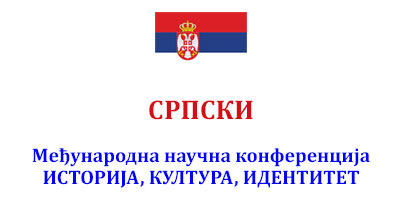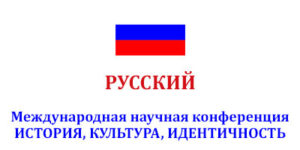
 —————————————————————–
—————————————————————–
International Scientific Conference
HISTORY, CULTURE, IDENTITY
Kosovska Mitrovica,
October 17–19, 2024
iki2024@pr.ac.rs
https://fifa.pr.ac.rs/istorija_kultura_identitet_2024/
—————————————————————–
![]()
The Faculty of Philosophy of the University of Priština in Kosovska Mitrovica organizes an international scientific conference History, Culture, Identity (IKI 2024) to be held in Kosovska Mitrovica оn October 17–19, 2024, under the auspices of the Ministry of Culture, the Ministry of Education and the Office for Kosovo and Metohija of the Republic of Serbia. The conference aims to discuss, elucidate, explore, and problematize various issues within the domains of history, culture, and identity through an interdisciplinary and multidisciplinary approach (incorporating insights from linguistics, literature, history, art history, philosophy, psychology, pedagogy, and sociology) and to examine the complex interrelations and connections between these domains and other societal phenomena.
The interdependence of historical processes, cultural changes, and mechanisms of identity development shapes how individuals interpret past events, adapt to social norms, and attain self-awareness within a socio-cultural context. Exploring identity development from contemporary perspectives and understanding how identity relates to different forms of the psychosocial functioning of an individual and society will be key objectives of psychological research. By thoroughly analyzing historical processes, events, and phenomena, the historiographical approach will answer numerous questions regarding the past, identify potential causes of current issues, and help avoid new challenges in the future. From the perspective of art history and utilizing innovative methodological approaches alongside interdisciplinary academic dialogue, art will be explored as an integration of cultural, political, and social norms, reflecting the distinct characteristics of various social groups and societies across different historical periods and regions. Sociology regards identities as individual and collective, always existing in an interplay of I – You and Us – Them dynamics, where identities represent positive attributes and stigmatizing features. The issue of identity has never been more scrutinized than in the modern era of globalization, leading to the development of comprehensive theoretical narratives with practical consequences in areas such as collective identity (e.g., nation-building, state-building) and individual identity (e.g., gender issues). In an era marked by identity crisis, the end of history, and the prevalence of subcultural behaviour patterns, philosophical research aims to rethink the dialectical relationship between history, culture, and identity, articulating the constants in change, the absolutes in history, and the essentials in identity. From the pedagogical theory and practice perspective, research into numerous educational concepts will contribute to developing national, cultural, scientific, humanistic, and democratic values in contemporary society, thereby enhancing the educational process. Linguistic research will focus on portraying language changes that occur over time due to the dynamic nature of societies and the current and historical events that shape them. Additionally, history, culture, and identity will be interpreted through various literary aspects, demonstrating how literary works illuminate the complexity of human experience, social norms, and individual and collective identities.
Plenary speakers
We are pleased to announce the plenary presentations of the following distinguished professors:
- Prof. Miloš Kovačević, University of Kragujevac, Faculty of Philology and Arts, Department of Philology, Kragujevac (Serbia)
- Prof. Tsenka Nikolova Ivanova, St. Cyril and St. Methodius University of Veliko Tarnovo, Faculty of Philology, Department of Slavic Studies, Veliko Tarnovo (Bulgaria)
- Prof. Radovan Antonijević, University of Belgrade, Faculty of Philosophy, Department of Pedagogy, Belgrade (Serbia)
- Prof. Uroš Šuvaković, University of Belgrade, Faculty of Education, Department of Philosophy and Social Sciences, Belgrade (Serbia)
Each plenary presentation will be allotted 40 minutes, including a ten-minute discussion.
Conference languages
The working languages of the conference are Serbian, English and Russian.
Abstract submission and registration
Applications for participation must be submitted no later than September 10, 2024, using the online form:
Пријавни образац – Registration Form – Образец заявки на участие
Please specify in the form whether you will be presenting onsite or online.
Presentations must be at most 15 minutes.
Each author may participate in a single presentation as the primary or co-author. A maximum of two authors per submission is permitted.
Notification of acceptance will be sent by September 15, 2024.
Conference fee
The registration fee per author is 6,000 RSD for participants from Serbia and 50 EUR for participants outside Serbia. The conference registration fee includes: attendance at conference sessions, conference materials, book of abstracts, proceedings, accommodation, food, refreshments, formal dinner, and excursion (visit to monasteries).
Payment instructions will be provided after the abstracts are accepted.
Conference publications
The Book of Abstracts will be published before the conference.
Full papers must be submitted by March 1, 2025. All papers accepted by two peer-reviewers will be published in thematic proceedings.
The participants will be informed in due course about the conference programme, accommodation, formal dinner, a visit to the monasteries of Kosovo and Metohija (scheduled for the third day of the conference), etc.
If you need further assistance, reach out to our Organizing Committee at iki2024@pr.ac.rs
We look forward to meeting you at the conference.
The Programme and the Organizing Committee History, Culture, Identity
| I M P O R T A N T D A T E S | |
| Conference: | 17–19 October 2024 |
| Abstract submission deadline: | 10 September 2024 |
| Abstract acceptance notification: | 15 September 2024 |
| Full paper submission deadline: | 1 March 2025 |
P R O G R A M M E C O M M I T T E E
- Prof. Zvezdan Arsić, Dean, University of Priština in Kosovska Mitrovica, Faculty of Philosophy, Department of Pedagogy, Kosovska Mitrovica (Serbia); President of the Committee
- Prof. Igor Đurić, University of Priština in Kosovska Mitrovica, Faculty of Philosophy, Department of Pedagogy, Kosovska Mitrovica (Serbia)
- Prof. Aleksandra Kostić Tmušić, University of Priština in Kosovska Mitrovica, Faculty of Philosophy, Department of Serbian Literature and Language, Kosovska Mitrovica (Serbia)
- Prof. Dragana Stanojević, University of Priština in Kosovska Mitrovica, Faculty of Philosophy, Department of Psychology, Kosovska Mitrovica (Serbia)
- Assoc. Prof. Dr. Branislava Dilparić, University of Priština in Kosovska Mitrovica, Faculty of Philosophy, Department of English Language and Literature, Kosovska Mitrovica (Serbia)
- Prof. Miloš Kovačević, University of Kragujevac, Faculty of Philology and Arts, Department of Philology, Kragujevac (Serbia)
- Prof. Radovan Antonijević, University of Belgrade, Faculty of Philosophy, Department of Pedagogy, Belgrade (Serbia)
- Prof. Slavko Petaković, University of Belgrade, Faculty of Philology, Department of Serbian with South Slavic Literatures, Belgrade (Serbia)
- Prof. Dragiša Bojović, University of Niš, Faculty of Philosophy, Department of Serbian Studies, Niš (Serbia)
- Prof. Vlada Stanković, University of Belgrade, Faculty of Philosophy, Department of History, Belgrade (Serbia)
- Prof. Uroš Šuvaković, University of Belgrade, Faculty of Education, Department of Philosophy and Social Sciences, Belgrade (Serbia)
- Prof. Suzana Rajić, University of Belgrade, Faculty of Philosophy, Department of History, Belgrade (Serbia)
- Prof. Jelena Erdeljan, University of Belgrade, Faculty of Philosophy, Department of Art History, Belgrade (Serbia)
- Prof. Saša Marković, University of Novi Sad, Faculty of Education in Sombor, Department of Social Sciences, Sombor (Serbia)
- Academician Miodrag Milin, Aurel Vlaicu University, Arad (Romania)
- Prof. Aleksander Naumow, Ca’ Foscari University, Department of Linguistics and Comparative Cultural Studies, Venice (Italy)
- Prof. Jelica Stojanović, University of Montenegro, Faculty of Philology,Study Programme of Serbian Language and South Slavic Literature, Nikšić (Montenegro)
- Prof. Petar Penda, University of Banja Luka, Faculty of Philology, Department of English, Banja Luka (Republic of Srpska, Bosnia and Herzegovina)
- Prof. Georgios Nektarios Lois, Hellenic Open University, School of Humanities, Study Programme of Orthodox Christian Theology and Religious Pluralism Studies, Patras (Greece)
- Prof. Margarita Veniaminovna Silantyeva, Moscow State Institute of International Relations (University) of the Ministry of Foreign Affairs of the Russian Federation, International Law School, A. F. Shishkin Department of Philosophy, Moscow (Russia)
- Prof. Tsenka Nikolova Ivanova, St. Cyril and St. Methodius University of Veliko Tarnovo, Faculty of Philology, Department of Slavic Studies, Veliko Tarnovo (Bulgaria)
- Prof. Zoran Matevski, Ss. Cyril and Methodius University, Faculty of Philosophy, Institute of Sociology, Skopje (North Macedonia)
- Prof. Marina Vicelja Matijašić, University of Rijeka, Faculty of Humanities and Social Sciences, Department of Art History, Rijeka (Croatia)
- Asst. Prof. Simon Malmenvall, University of Ljubljana, Faculty of Theology, Ljubljana (Slovenia)
- Assoc. Prof. Ljiljana Jerković, University of Banja Luka, Faculty of Philosophy, Study Programme of Pedagogy, Banja Luka (Republic of Srpska, Bosnia and Herzegovina)
- Assoc. Prof. Kalina Sotiroska Ivanoska, Ss. Cyril and Methodius University, Faculty of Philosophy, Institute of Psychology, Skopje (North Macedonia)
- Asst. Prof. Sara Corizzato, University of Verona, Department of Foreign Languages and Literatures, Verona (Italy)
- Prof. Aleksandra Pavlovna Ushakova, Tyumen State University, Institute of Social Sciences and Humanities, Department of Linguistics and Literature, Tyumen (Russia)
- Prof. Biljana Milošević Šošo, University of East Sarajevo, Faculty of Philosophy, Department of Sociology, Pale (Republic of Srpska, Bosnia and Herzegovina)
- Prof. Ljupčo Keverski, St. Clement Ohridski University, Faculty of Education, Bitola (North Macedonia)
O R G A N I Z I N G C O M M I T T E E
- Assoc. Prof. Snežana Zečević, President of the Committee
- Prof. Zoran Jovanović
- Prof. Brankica Popović
- Prof. Dušan Ranđelović
- Assoc. Prof. Saša Stanojević
- Assoc. Prof. Tatjana Radojević
- Assoc. Prof. Stanislav Stanković
- Assoc. Prof. Jelena Bajović
- Assoc. Prof. Ana Andrejević
- Assoc. Prof. Tatjana Kompirović
- Assoc. Prof. Nedžib Prašević
- Asst. Prof. Branislava Vučković
- Asst. Prof. Danijela Tešić Radovanović
- Asst. Prof. Aleksandar Kostadinović
- Asst. Prof. Jugoslava Rakić Mladenović
- Suzana Stojković, Senior Lecturer
- Milica Marjanović, Teaching Assistant
- Luka Jovanović, Teaching Assistant
- Anđela Keljanović, Teaching Assistant
- Jelena Jovanović, Teaching Assistant
- Nina Miljković, Teaching Assistant









